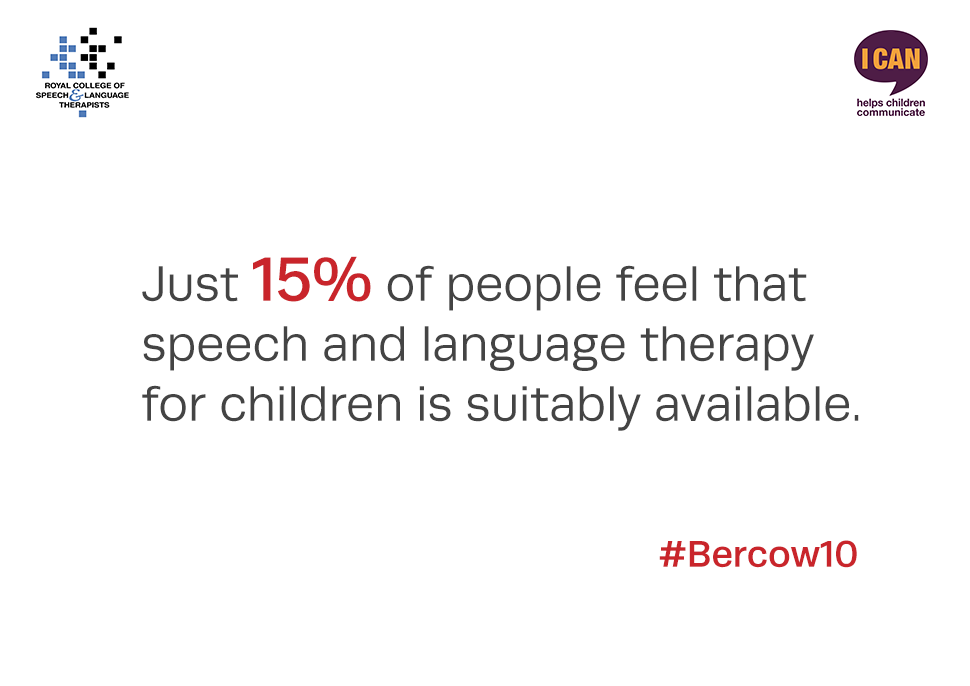I CAN detail how their new independent report presents a real and updated picture of the experiences of children and young people with SLCN and their families, ten years on from The Bercow Report
Very few weeks pass by without us seeing the publication of the latest new report or review; a ‘must read’ for everyone. How many of these do you see however that have a focus on absolutely crucial skills, evidenced to have an effect on children and young people’s education, their employability and their mental health?
Tuesday 20 March 2018 saw the launch of Bercow: Ten Years On, an uncompromising review of support for children with speech, language and communication needs (SLCN) in England. A decade on from the original, government backed publication, The Bercow Report: A Review of Services for Children and Young People (0-19) with Speech, Language and Communication Needs. This new independent report from I CAN, the children’s communication charity and the Royal College of Speech and Language Therapists (RCSLT) presents a real and updated picture of the experiences of children and young people with SLCN and their families.
Given what we know about the prevalence of SLCN, this report is particularly important. 7.6% of children have a developmental language disorder that persists throughout school and impacts on learning and on their social and emotional development; at least two pupils in every classroom.
In some deprived areas of the UK, this figure is much higher – as many as 50% of children start school without the language they need to learn, learn to read or make friends. With clear evidence that shows the significant impact of SLCN on children and young people across the age range and on learning, socialisation and later life chances, never has it been more important to ensure the support that is needed is in place.
However, informed by evidence from more than 2,500 people, Bercow: Ten Years On shows that sadly, this is not the case. In fact, the report heard from many people that their experience of services is poor; that for families the journey to try to get support for their child is a “long, harrowing and tortuous” one; that systems do not prioritise speech, language and communication, or support for those who are struggling. Key findings from the report show:
- Communication is crucial to children’s life chances. Yet awareness of its importance among the public and decision makers is not sufficient. This impacts on how well families can access the information they need – 77% of parents and carers said information about SLCN was either not easily available or not available at all.
- Strategic system-wide approaches to supporting SLCN are rare. Very often SLCN does not feature in national or local policies. In fact, 95% of people felt that central government’s contribution to raising standards and improving outcomes for children and young people with SLCN is either not clear or in need of strengthening.
- Services that are inaccessible and inequitable. Too often support for children’s SLCN is planned and funded based on the available resources, rather than what is needed, leading to an unacceptable level of variation across the country. Only 15% of people said that speech and language therapy was available in their area as required.
- Support that makes a difference is based on the evidence of what works. However, service design and cuts frequently do not take account of the evidence we have. We heard, for example, from areas where support was only available to children younger than five, from services that only supported children with the highest need, that didn’t offer training.
- Too many children with SLCN are being missed and are not getting the vital support they need. Worryingly, only 12% of parents said their child’s difficulties were identified by a professional.
Thankfully, the picture is not a completely bleak one. Ten years after the original report, data from Bercow: Ten Years On tells us that the expertise of school and early years staff to identify and support children and young people’s speech, language and communication has improved, although there is still a way to go.
The report also contains evidence of where things are working well in a series of good practice examples. A common thread that runs through these is the presence of strong leaders with a never-ending commitment to improving services for children and young people and a determination to design approaches based on evidence.
Of course, this isn’t the end of the story for Bercow: Ten Years On. The report and website include recommendations for government and local leaders to ensure change takes place and is sustainable and embedded. I CAN and RCSLT have made a commitment to ensure these are enacted. Alongside this, there are also calls to action for those involved in supporting children and young people and signposts to helpful information so that practitioners, children and young people and parents and carers can take bold first steps to change things locally.
Some of these may be for you. So, if you’ve not yet read Bercow: Ten Years On, be sure to add it to your ‘must read’ list.
Bercow: Ten Years On Project Team
I CAN
Tel: +44 (0)20 7843 2510
The Royal College of Speech and Language Therapists
Tel: +44(0)207 378 1200












